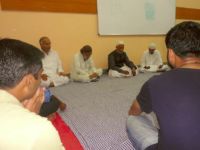On 3 July 2015 the Education Minister of the Maharashtra government dropped a bomb shell. He announced that Madrasas which do not teach primary subjects such as English, Maths and Science would be considered as “non-schools” and children studying in them as “out of school” kids. This decision was conveyed in a letter written by the state’s minority affairs department to the school education department. This directional order drew fierce criticism from several quarters including the opposition parties, and from many Muslims and Muslim institutions (See: http://indianexpress.com/article/india/maharashtra/madrasas-de-recognised-in-maharashtra-classified-as-non-schools/#sthash.m43zVeTW.dpuf). Reacting sharply to the government decision, the president of the All India Majlis-E-Ittehadul Muslimeen(AIMIM), Asaduddin Owaisi, questioned the rationale behind the government’s decision, since “there are many madrasas that are teaching Maths, English and science. Many madrasa students have gone ahead and cracked civil services exams,”he said (See: http://www.msn.com/en-in/news/other/muslim-leaders-oppn-criticise-move-to-call-madrasas-non-schools/ar-AAcsLQD).
The government move is certainly an injustice to a large number of Madrasa students who come from poor and lower middle class families. They enrolled in madrasas since they could not afford to go to regular schools. Making madrasas “non-schools” and the students of madrasas as “out-of-school-children” is no way to meet the RTE (Right to Education) mandate to provide education for all. Moreover, it appears to us that this move is part of a larger move to target the Article 26 in The Constitution of India (1949). Article 26 of the Constitution of India 1949, categorically affirms in no uncertain terms that ‘. . . every religious denomination or any section thereof shall have the right to establish and maintain institutions for religious and charitable purposes; to manage its own affairs in matters of religion; to own and acquire movable and immovable property; and to administer such property in accordance with law’.”
Many Muslim scholars do emphasize that madrasas need urgent reforms. Dr Waris Mazhari who wrote a thesis on Madrasa Reforms, while discussing noted in a personal conversation with the present writer: “the madrasas need reform … their libraries are woefully inadequate. They don’t offer many extra-curricular activities, other than perhaps training their students in delivering speeches. They do not allow their students to gain anything but a much skewed understanding of what’s happening in the outside world. As far as hygiene is concerned, their conditions are dismal, especially in many north Indian madrasas, and so is the quality of the food that their students are given”.
He affirmed further that madrasa curriculum is also in urgent need of reform. He added: “… as far as ‘modern’ subjects are concerned, madrasas are way, way behind. Even the teaching of Hadith (sayings attributed to the Prophet) and Quranic commentary, most madrasas leaves much to be desired—these are generally taught from a sectarian perspective. Most students are not able to understand the Quran on their own. They aren’t free to think about social issues and how to respond to them”.
Dr Mazhari further noted that while Madrasas give a great deal of stress to teaching fiqh, they fail to discuss contemporary social issues. He said what worried him the most was that a “great deal of time and energy is spent in trying to defend and insist on the supremacy of one’s own school of fiqh and in denouncing other Muslim schools of thought and jurisprudence”.
While being a student at Jamia Millia Islamia I have spoken to a number of friends and colleagues who insist that madrasas must introduce ‘humanities’ within the curriculum. Madrasas cannot afford to leave out Maths and Geography, Science, Civics and English is their definite opinion. It is important to note that such calls for change come from the Muslim intellectuals. When the ‘need-to-change’ realization comes from within the community it will open new avenues for the community to deal with issues that arise in contemporary times.



Leave A Comment
You must be logged in to post a comment.